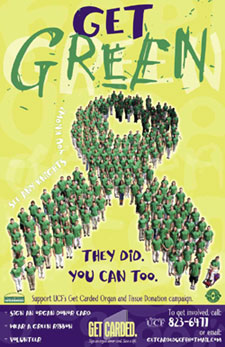
"Get Carded" to Save Lives
Students educate Florida
about organ donation
By
Lesley Ann Moorman-McMillen
College students know all too well what it’s like to wait. They wait in line to register for classes, buy books, and eat lunch every day. None of this compares, however, to the time one student spent waiting for a very special gift—LIFE.
 Julie
Helton, University of Central Florida
graduate, will never forget losing one of her best friends to a battle that
not only affected her, it affected the nation. Today, thousands await
lifesaving organ and tissue transplants, yet only a fraction receive them.
Although 85 percent of the U.S. population approves of donation, less than
half have made a personal decision regarding the issue. It was this reality
that took a friend’s life and left Helton with the determination to do
something about it.
Julie
Helton, University of Central Florida
graduate, will never forget losing one of her best friends to a battle that
not only affected her, it affected the nation. Today, thousands await
lifesaving organ and tissue transplants, yet only a fraction receive them.
Although 85 percent of the U.S. population approves of donation, less than
half have made a personal decision regarding the issue. It was this reality
that took a friend’s life and left Helton with the determination to do
something about it.
In 1997, Helton contacted TransLife, Central Florida’s organ and tissue donation and transplantation program, about creating an event that emphasized the need for organ and tissue donation. Volunteer UCF, the campus volunteer program, partnered with the transplant program and launched Get Carded. Their goal was simple—help save lives by educating the campus community about donation. Before they knew it, Get Carded developed into a year-round campaign.
“Get Carded had the elements of success from the beginning,” says Helton, now a learning specialist at Orlando’s Durrance Elementary School.
The secret to its success was peer-to-peer education. They emphasized that “getting carded” was no longer something students did as a result of bad choices. Instead, students could “get carded” as a result of doing something wonderful—showing their commitment to help save lives by signing an organ and tissue donor card. Students drove the campaign, rallying campus support through events, media coverage, presentations and ongoing promotion. The students received massive amounts of support by focusing on campus leaders, including UCF President Dr. John C. Hitt, directors of student organizations, service groups, faculty, alumni and more. As a result of its success, the Florida Coalition on Donation, a non-profit alliance of donor programs, individuals, and organizations dedicated to saving lives through donation adopted the program for expansion to other campuses. Get Carded is now promoted at the University of South Florida, Florida Atlantic University, the University of Florida, and the University of North Florida. Helton is amazed that the program has become so popular. “I wanted the program to be a success for UCF, but I had no idea it would go this far,” she says.
Like Helton, other students have joined the effort because they too have been affected by donation.
Melissa Day, UCF senior and student director, knew she had to be part of Get Carded for Evan’s sake. Evan, her boyfriend’s younger brother, had dreams of becoming a fighter pilot but never achieved them because he was killed while riding his bicycle in 2001. Ironically, Evan informed his family that he wanted to be an organ donor just weeks before the accident. “Knowing that Evan didn’t lose his life in vain helped us cope with our loss. Giving others the second chance to live was the only thing that made sense out of losing such a beautiful 14-year-old boy,” Day says.
Erin Thompson, former UF student director, is one of the most active volunteers with Get Carded. Her motivation is J.P. Morton, her 25-year-old fiancé who has been waiting for a liver transplant for more than three years. When she saw the opportunity to express her passion for the issue personally and professionally, she got involved right away. “For me, it’s extremely painful to watch J.P. go through what he does. He remains very strong and upbeat about it all—and I’m very proud of him—but we worry about our future. We want to do so many things together,” says Thompson, now an employee of Southeast Tissue Alliance and Florida Coalition on Donation liaison to the UF Get Carded program. Her greatest fear is that J.P. won’t get a transplant in time because there aren’t enough people willing to donate.
Vanessa Bowman, UCF junior and Get Carded volunteer, has been in Thompson’s shoes. She’ll never forget when the physician uttered the words: your father needs a liver transplant. She didn’t want to believe it, hoping she would wake up from a bad dream. For her, the experience was surreal. It changed everyday life for the Bowman family. Every time the phone rang, they wondered if it was the transplant program calling to let them know that a liver had become available. “It’s the only thing you can think about. I would wonder, ‘When is it our turn? When is my Dad going to get the call?’” Bowman says.
Fortunately, her father received a liver transplant and is doing well today. That’s why she got involved with Get Carded. According to Bowman, people don’t understand how desperately people need transplants. She said it’s the lack of knowledge that empowers students to educate the campus community.
When the program first began, more than 51,000 patients were on the national transplant waiting list. Today, there are more than 81,000. Julie Helton believes this gives Get Carded an opportunity to educate people across the board, and that’s exactly what volunteers are doing on their campuses.
Each campaign is unified and unique. They share the simplicity, pride, and inspiration to help save lives, but they do it in different ways. UF has spread the word through an art contest and homecoming parade. USF has shared Get Carded with vast audiences through its “Movies on the Lawn” and open mic nights at a local coffee house. One of the most unique events, however, was the Greek Green Ribbon Day, that both UCF and UF hosted. At the UCF, 300 fraternity and sorority students formed a living green ribbon, which symbolizes organ and tissue donation. The photo was later developed into a poster to promote the campaign on campus.
Although promotion adds spice to the mix, the main objective is to get students, faculty, and staff to adopt the Get Carded effort and continue spreading the word about the need for donation. As a result of widespread support, the program continues to grow throughout the state.
Some might say that it’s the great volunteers, dedication and personal connections to the issue that have made Get Carded popular. Julie Helton says it’s more than that. It hits home with everyone. It’s as simple as telling your family and signing a donor card. When the students communicate this powerful message, people listen and its simplicity catches on.
For information on how to implement a similar program or educate your campus community on the need for organ and tissue donation, please contact the Florida Coalition on Donation at 877-FL-SHARE.
Contact Moorman-McMillen at lesley.moorman-mcmillen@translife.org.
How You Can Help
Get Carded
-
Learn the Facts
-
Sign and carry an organ and tissue donor card and/or include donation on your driver’s license
-
Share your decision with your family
Get Involved
-
Encourage others to donate life
-
Distribute donor cards or brochures
-
If attending one of the five Get Carded campuses, volunteer yourself or your organization for events and activities
Copyright © 2005 Oxendine Publishing, Inc. All rights reserved
Write
For Student Leader |